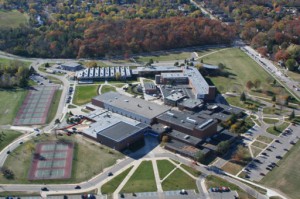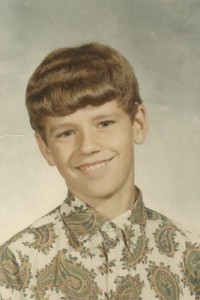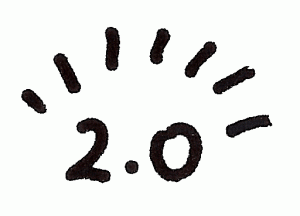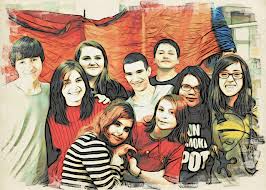
Coop Goes to High School Part 6 – In Front of the Lights

At the moment, Junior Light Opera, the unique youth theater group I had plunged into the midst of, was my main developmental “growing edge”, along with the feminist ideologies I was being exposed to in my extended “family” of my mom’s close female friends (what I now dub my “Feminist Aunts”). In JLO I had become a respected member and part of the leadership circle of the company and had developed and demonstrated my technical skills backstage, behind the lights. I was now about to take the leap of going out on stage, in front of those lights and in front of an audience, waiting for me and my fellow actors to entertain and otherwise engage them.
Again, as in the previous segment of this story, I have changed the names of my friends for their privacy.
Coop Goes to High School Part 5 – Behind the Lights
 The story picks up in November 1970 almost halfway through three years of high school, still recovering from having jilted my first girlfriend (and being too shy to even face her after that), and Smokey Robinson part of my current Greek chorus on the AM radio with his “Tears of a Clown”…
The story picks up in November 1970 almost halfway through three years of high school, still recovering from having jilted my first girlfriend (and being too shy to even face her after that), and Smokey Robinson part of my current Greek chorus on the AM radio with his “Tears of a Clown”…
Now if there’s a smile on my face
It’s only there trying to fool the public
But when it comes down to fooling you
Now honey that’s quite a different subject
But don’t let my glad expression
Give you the wrong impression
It reminded me that the persona I was putting out in the world was still mostly smoke and mirrors as well. That admitted, my Junior Light Opera youth theater group was opening up a new world of possibilities for me to define myself as a talented technician rather than just a lovelorn loser.
Just a quick note before we get into this segment… I’ve changed all the names of my friends to protect their privacy.
Coop Goes to High School Part 4 – The Play’s the Thing
 I returned from my summer in England just a week before school was to start for my junior year of high school, having missed my normal summer activities and been disconnected from my neighborhood friends for those ten weeks I had been gone, but also having undergone a personal transformation from my summer odyssey. I was still a shy kid, but I had a heightened sense of agency from partnering with my mom on our summer adventure in England. I was ready in this school year ahead to play a more active role charting my own course rather than just going with the flow of my school classes and current neighborhood social circle.
I returned from my summer in England just a week before school was to start for my junior year of high school, having missed my normal summer activities and been disconnected from my neighborhood friends for those ten weeks I had been gone, but also having undergone a personal transformation from my summer odyssey. I was still a shy kid, but I had a heightened sense of agency from partnering with my mom on our summer adventure in England. I was ready in this school year ahead to play a more active role charting my own course rather than just going with the flow of my school classes and current neighborhood social circle.
Coop Goes to High School Part 3 – Summer Swap to England

An opportunity presented itself in the spring of 1970 when my mom heard from an acquaintance that they had traded houses with a family in Oxford England for the summer, both being big college towns with people always looking to take classes at the other university. So my mom placed an ad in the Oxford University paper and got a reply from a graduate student who was looking to come to the University of Michigan with his wife to attend a special summer program. My mom worked it out with them that we would exchange both our houses and our cars for ten weeks, from the last week of June until late August. We got our passports and my mom managed to find a cheap charter flight for herself, my brother and I from the nearby Detroit airport to Amsterdam in late June returning from London Gatwick airport in late August. She made hotel reservations for our first few days in Amsterdam, until such time as the house was vacant in Oxford.
Coop Goes to High School Part 2 – First Year
 Continuing from part one, this is part two in my attempt to recollect and record in writing my high school years which were so significant to me developmentally, not so much because of what I did in class, but what I did in my life beyond the schoolroom.
Continuing from part one, this is part two in my attempt to recollect and record in writing my high school years which were so significant to me developmentally, not so much because of what I did in class, but what I did in my life beyond the schoolroom.
Pioneer high school was a big public high school with over 2000 students, one of two at the time in Ann Arbor, located on the southwest side of town about a mile and a half from my house. It was a sprawling building on an even bigger campus of lawn and parking lots looking more like a high-tech business campus than a typical high school. When I first entered to register for classes the week before school started the main hallway was broad and institutional with what I remember to be a polished formica or marble-like floor, nothing to give the place a sense of a human scale. The school was a string of buildings connected in an L-shape, maybe at least a quarter of a mile from one end to the other.
Coop Goes to High School Part 1 – Good Riddance to Junior High

Oh say can you see
My eyes if you can
Then my hair’s too short
The iconic Woodstock music festival, which I knew nothing about at the time, was happening in upstate New York that August, the climactic event in what some would later call the “summer of love”. But the musical Hair at least made me familiar with that counterculture that was emerging with its “flower children” driven by a mantra of “peace, love, joy” facilitated by “sex, drugs and rock-n-roll” which allowed you to “tune in, turn on and drop out”.
Civilization 2.0 – The Facilitation Edition
 For five-thousand years human civilization has been about a small privileged elite mostly directing the activity of the rest of us. The bankruptcy of this approach to human society, if not evident previously, became brutally so in the 20th Century when some of the most “advanced” countries on Earth sent millions of their young people to slaughter each other for national pride and systematically exterminated millions of other people simply attempting to live their lives in peace.
For five-thousand years human civilization has been about a small privileged elite mostly directing the activity of the rest of us. The bankruptcy of this approach to human society, if not evident previously, became brutally so in the 20th Century when some of the most “advanced” countries on Earth sent millions of their young people to slaughter each other for national pride and systematically exterminated millions of other people simply attempting to live their lives in peace.
Better late than never, there is a more egalitarian approach to human civilization that we have to date only seen small glimpses of. In the vision of great thinkers like Isaiah, Laozi, Gautama Buddha, Jesus of Nazareth, Michael Servetus, Mikhail Bakunin, Maria Montessori, John Dewey, Emma Goldman, Mahatma Gandhi, Martin Luther King Jr., and Aung San Suu Kyi. In the consensus governance practices of the Quakers and the Iroquois. In the egalitarian societies of Scandinavia and the principles embodied in the Universal Declaration of Human Rights.
Some of the key principles of this revised approach to civilization beyond control and conformity include…
A Democratic Alternative Legacy within Command & Control Public Education
 Public education in the U.S. has featured state control of human development since Horace Mann and other educational “reformers” within the New England Protestant elite brought this novel approach of Prussian state-run universal compulsory schooling to America in the 1830s. Canadian educational policy followed a similar “melting pot” social engineering of immigrants path while accepting a greater role for Protestant and Catholic education in the mix with secular public schools. Today in both countries the bulk of public schools chart their course in sync with (or under the yoke of) continuing state efforts at high-stakes OSFA (one size fits all) standardization, though more so in the U.S. than in Canada.
Public education in the U.S. has featured state control of human development since Horace Mann and other educational “reformers” within the New England Protestant elite brought this novel approach of Prussian state-run universal compulsory schooling to America in the 1830s. Canadian educational policy followed a similar “melting pot” social engineering of immigrants path while accepting a greater role for Protestant and Catholic education in the mix with secular public schools. Today in both countries the bulk of public schools chart their course in sync with (or under the yoke of) continuing state efforts at high-stakes OSFA (one size fits all) standardization, though more so in the U.S. than in Canada.
I find this top-down “command and control” approach to public education at best boring and at worst very depressing, based on how I believe it diminishes the human imagination in particular and the human spirit in general. So as an advocate for what I call “many educational paths”, I celebrate and take heart from those rare educational alternatives that manage to find a way to exist within the leviathan of standardized public education. Sure there are a fair amount of private schools (for the more economically privileged among us) that follow these more human development supporting educational models, but I take my hat off to a community that can conceive and support a public school that challenges the hegemony of conventional standardization.
One such school that I recently read about in an online discussion on the AERO (Alternative Education Resource Organization) listserv is the Alpha II school in Toronto Ontario. It is the more recent incarnation of the original Alpha school, set up in 1972 in the heyday of the progressive education movement in Canada and the U.S. A movement that produced alternative public schools in many communities, including two – Earthworks and Community High School – begun a year earlier in my own hometown of Ann Arbor Michigan. FYI… Earthworks eventually merged with Community High and the latter is still going strong, but many of these unorthodox public schools have been forced to close due to the increasing standardization of education over the past twenty years.
The story of Alpha and Alpha II in particular I find fascinating, an insight into a chapter of education history and highlighting perhaps a somewhat more open-minded approach to public education in Canada. The story is courtesy of AERO members Carol Nash, a co-founder of the unorthodox school, and Deb O’Rourke, the school’s current volunteer coordinator.
Thoughts on Civilization & Privilege
 For nearly 200,000 years our human species (homo sapiens) lived on this bountiful planet in what most anthropologists now believe were mostly small egalitarian bands or tribes of hunter-gatherers, less than a million people scattered about Earth’s various habitable environs living for the most part peacefully with each other and within the larger web of nature. Each autonomous group might be as few as 10 to as many as 100 people generally woven together by a web of kinship with a basic equality among members including between men and women. It is generally believed today that all told, these people lived good lives in harmony with nature and were anything but the conventional pejorative notion of “savages”.
For nearly 200,000 years our human species (homo sapiens) lived on this bountiful planet in what most anthropologists now believe were mostly small egalitarian bands or tribes of hunter-gatherers, less than a million people scattered about Earth’s various habitable environs living for the most part peacefully with each other and within the larger web of nature. Each autonomous group might be as few as 10 to as many as 100 people generally woven together by a web of kinship with a basic equality among members including between men and women. It is generally believed today that all told, these people lived good lives in harmony with nature and were anything but the conventional pejorative notion of “savages”.
Unlike the tribal “chiefs” we are familiar with in contemporary indigenous societies, most bands of hunter-gatherers are believed to have operated without permanent leaders, with various community members taking initiative based on their expertise in the particular task being performed. Think more the informal organization of a contemporary large extended family or a group of people on a field or camping trip rather than a highly stratified hierarchy of decision making. The fact that this organization of our species evolved naturally and continued for nearly 200,000 years mostly unchanged speaks to its efficacy and compatibility with innate human nature.
What I’m really wrestling with these days is the most recent 5000 to 10,000 years of our history, specifically our experiment with “civilization”, which seems to have been quite a mixed bag. In an effort to see what lies beyond and maybe even evolve beyond our nature, we created complex human societies where we all participate (some willingly but many coerced) as a sort of super-organism that has been able to explore and take control of virtually all of our planet’s territory and natural resources, compile an edifice of knowledge now almost universally available through the Internet, and take at least the first baby steps to explore beyond the friendly confines of our planet. A super-organism mimicking a purely biological organism which has a certain small portion of that organism dedicated to its control and executive function.
At its best this experiment with civilization has created a world that currently allows seven billion unique souls to inhabit it at the same time, share an incarnation on a beautiful planet, and share ever more connectedness with (through diminishing degrees of separation from) each other.
But the downside is that we have created complex societies and institutions within those societies which as designed require a controlling elite executing that executive function in a way that generally favors that subset of people at the expense of the rest of us participating in the super-organism. This privilege of a controlling elite may or may not have been an aspect of previous human hunter-gatherer societies, but it continues to be a foundational cog of our “civilization” approach to human society.
What’s a species to do?